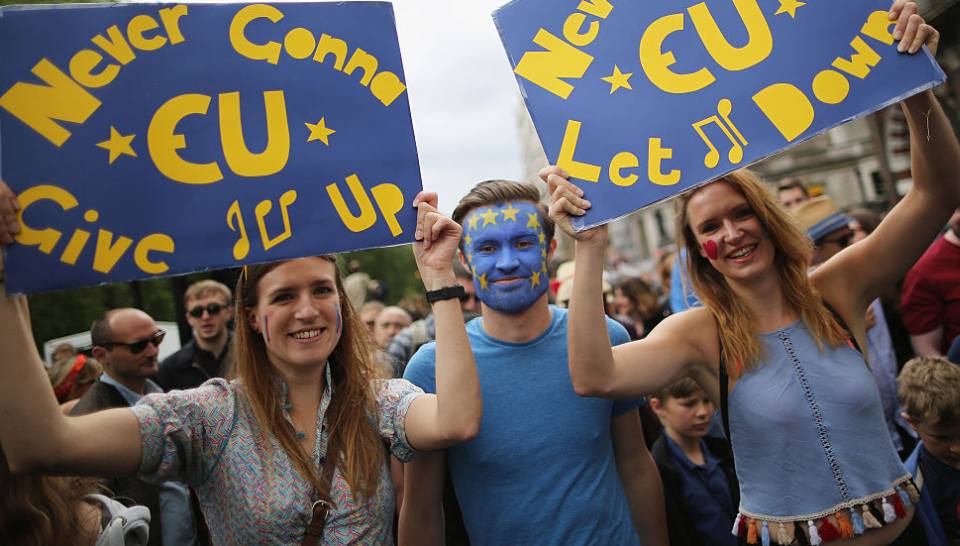The march against the masses
London’s pro-EU rally showed how fragile democracy is.

Time was people would march on parliament calling for the expansion of freedom or democracy – for the voice of the ignored or disenfranchised masses to be heard. Saturday’s March for Europe in London – in which thousands of spurned Remainers marched from Park Lane to Parliament Square calling for the EU referendum result to be overturned – was, by contrast, the starkest expression yet of the fuming, anti-democratic sentiment that has come to the fore post-Brexit.
This was not a March for Europe. This was a march against democracy. Sure, as participants were quick to point out, they have a democratic right to vent, as organiser Mark Thomas put it to the BBC, their ‘anger, frustration’ and ‘need to do something’. But any demo that calls so openly for the expressed will of the people to be overturned can hardly claim the moral high ground.
The message from the sea of colourful, pun-laden placards was clear: Brexit voters were misled, confused, whipped up into a xenophobic fever, and thus parliament, the responsible adults, should step in. ‘Parliament must address mass deception’, read one: ‘Democracy or a travesty???’ ‘The monkeys have taken over the asylum!’, declared another. For all the Remain camp fearmongering about post-Brexit xenophobia, its own fear and loathing of the Leave-voting masses was on full show.
As spiked found out, interviewing protesters for our video report, the protesters felt the political class should correct the mistake of the dumb demos. ‘We have an elected democracy so that our MPs, who do know more about these kinds of things, they can make these decisions for us’, one told us. Only politicians, armed with the right expertise, they said, were capable of taking such profound decisions: ‘Experts. We need experts to speak. People who have PhDs in European law.’
This outpouring of anti-democratic sentiment, this unquestioned faith in the wisdom of the elite over the will of the people, did not begin with the Brexit vote. Through the rise of evidence-based policy and quangos, experts have crept into more and more areas of policymaking. And the sentiment that the masses are a bit thick, brainwashed by the media and stirred up by demagogues, has long greeted every General Election result that doesn’t go the metropolitan elite’s way.
But the Brexit fallout has brought this long unspoken prejudice out of the bistros and into the streets. The idea that the people are effectively incapable of taking part in politics, that you need a PhD in European law to have an opinion on EU membership, is now being shouted from the rooftops and scrawled on placards. Left-wing Remain types, so long the sort who would pretend to speak on behalf of the little people, are now openly calling for elite rule.
As one reporter pointed out on Twitter, this was a ‘pro-establishment protest’, and the protesters made no bones about saying so. There was constant talk of the ‘national interest’, of the ‘madness’ that needed to be stopped in the name of protecting our economy and future. This is the language of patrician ministers, not bedraggled rebels. Those who should be railing against our democratic rights being subordinated to higher, elite concerns are now willing it on.
When the protesters weren’t deferring to experts, they were claiming the mantle for themselves. Having all seemingly consumed the same primer on Britain’s constitutional arrangements, many talked up parliamentary sovereignty and how British democracy is not rule-by-plebiscite. This is not only a bit rich, considering they were invoking parliamentary sovereignty in defence of an institution – the EU – that exists to limit parliaments’ right to act in their own nations’ interests; it is also entirely disingenuous.
Yes, the House of Commons retains parliamentary sovereignty, but this is derived from the will of the people – from popular sovereignty. Any real democrat knows that power does not originate from Westminster; it is democratic support that gives parliament the legitimacy to act and to govern. To suggest that parliament should use the power lent to it by the public to override the public’s will makes a mockery of parliamentary democracy itself.
Referendums are not the only way to make democratic decisions. In an ideal world, we would have politicians with the leadership, conviction and connection with the public necessary to make the popular will a reality. Yet for all the narrow, party-political reasons the referendum came about, the Brexit vote has taken on great significance because of the chasm that exists between the people and the elite. The eking away of political authority, rooted in this disconnection, is what made this break with the status quo so vital.
Anyone who believes in democracy, whether Remainer or Leaver, should be appalled by the bald, elitist sentiments now being expressed. To circumvent the Brexit vote now would be to destroy democracy for a generation. In the name of parliamentary sovereignty, popular sovereignty would be obliterated. But the march also did us a favour. It showed us how fragile democracy is, how intent many people are on giving our reeling elite an excuse to ignore the democratic will. That is, it showed us how much is left to fight for.
Tom Slater is deputy editor of spiked. Follow him on Twitter: @Tom_Slater_
Watch spiked’s video report from the march:
Join spiked’s campaign for democracy, Invoke Article 50 NOW!.
To enquire about republishing spiked’s content, a right to reply or to request a correction, please contact the managing editor, Viv Regan.









Comments
Want to join the conversation?
Only spiked supporters and patrons, who donate regularly to us, can comment on our articles.